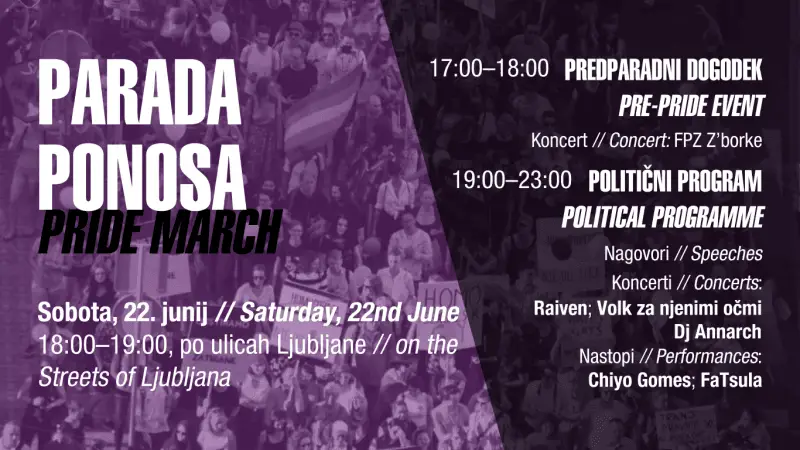The ministry noted the recent progress of ensuring human rights for the LGBTI community, but it also pointed out that in more than 70 countries, same-sex relationships were still criminalised and could result in the death penalty.
Even in countries with national legislation safeguarding LGBTI rights, the community is still facing discrimination, hate speech, prejudices or even stigma, said the ministry in its Friday's press release.
Thus, the rights of LGBTI persons are violated, including their citizenship, political, economic, social and cultural rights.
The criminalisation of same-sex intimacy allows the perpetrators of anti-LGBTI hate crimes to go unpunished while encouraging intolerance and violence within individual societies, said the ministry.
Countries thus need to fulfil their obligations based on international human rights protection documents, and do their best to provide equal treatment to everyone without discrimination.
Slovenia will continue to strive at the international level to keep the issues of discrimination and violence based on sexual orientation and gender identity on the agenda of international and regional organisations, including the UN, CoE and EU.
This is in line with the EU guidelines on promoting and protecting all human rights of the LGBTI community as well as the EU guidelines on non-discrimination in external action.
Since 2016, Slovenia has been actively participating in the international Equal Rights Coalition, which is dedicated to the protection of the rights of LGBTI persons and strives to end discrimination and violence against them.
Marking the International Day Against Homophobia, Transphobia and Biphobia (IDAHOBIT), the International LGBTI Asscociation ILGA, which cooperates with the CoE, has published the Rainbow Europe Map, ranking countries according to their level of anti-LGBTI discrimination and violation of LGBTI human rights.
Slovenia ranked 20th among 49 countries, ahead of Estonia and following Hungary.
The ILGA warned that Slovenia still did not ensure completely equal marriage laws for everybody, nor did it unequivocally grant same-sex couples the right to adopt children or to artificial insemination.
The association also pointed out that the country had a law banning hate speech based on sexual orientation, but it did not have a law banning hate speech on the grounds of gender identity.
The Slovenian NGO Legebitra called for en end to violence against LGBT persons, including verbal abuse in public, discrediting of LGBT organisations, bullying, discrimination in healthcare or other institutions as well as physical abuse.
The organisation said that homophobia, biphobia and transphobia were still present in society, while LGBT rights NGOs were being targeted more frequently due to the rise of fake news.
According to them, promoting hate and violence against the LGBT community has pervaded some parties' manifestos and politicians' statements ahead of the EU elections.
Legebitra has thus urged all the parties and candidates standing in the upcoming EU elections to oppose this discrimination and to protect LGBT rights.


